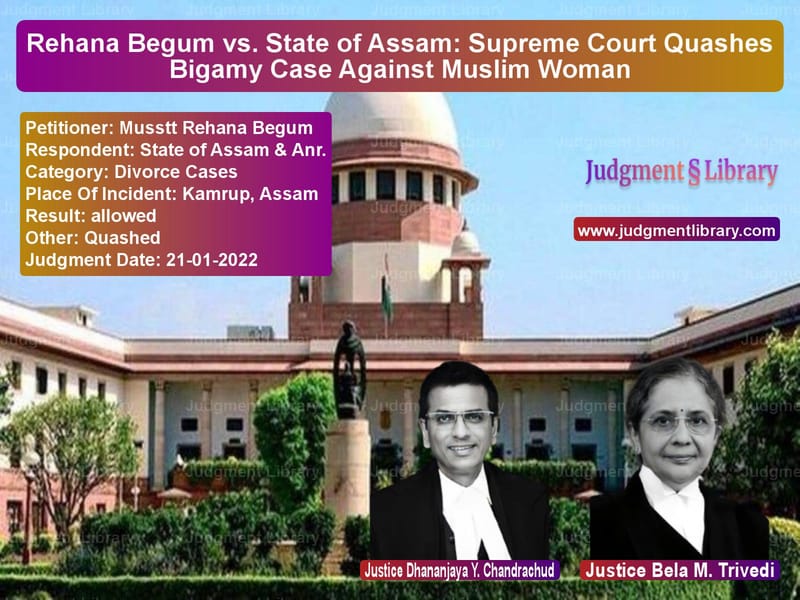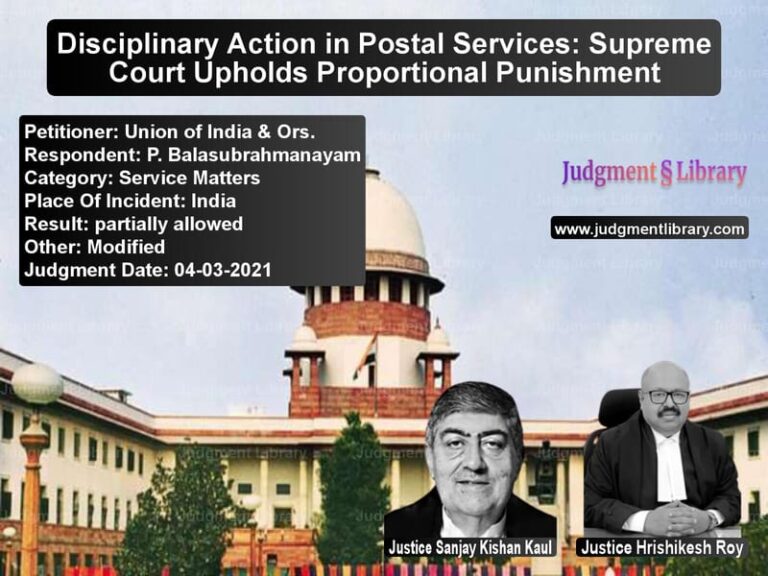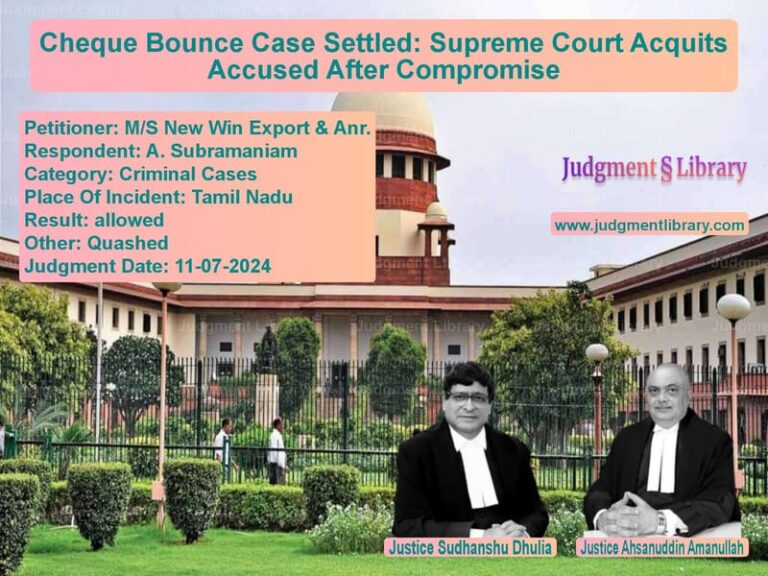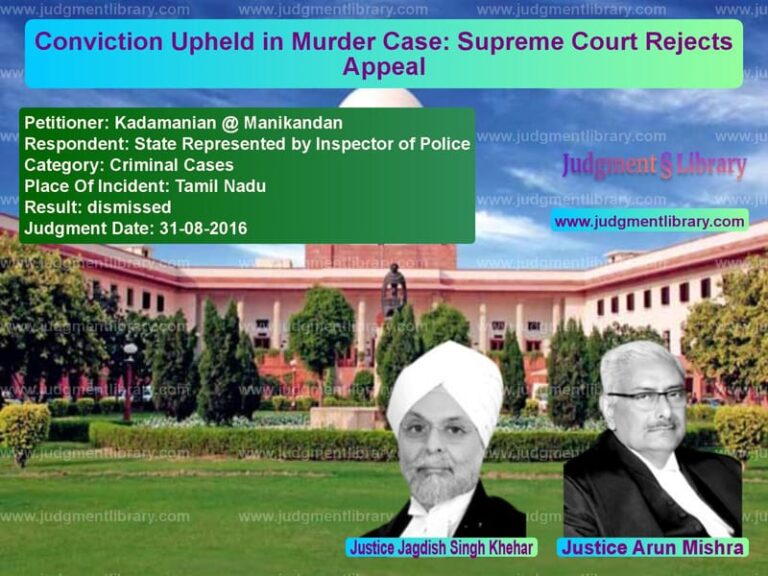Rehana Begum vs. State of Assam: Supreme Court Quashes Bigamy Case Against Muslim Woman
The case of Musstt Rehana Begum vs. State of Assam & Anr. revolves around allegations of bigamy and fraudulent concealment of a previous marriage. The Supreme Court examined whether a Muslim woman, Rehana Begum, could be prosecuted under Sections 494 and 495 of the Indian Penal Code (IPC) for allegedly remarrying while her earlier marriage was still subsisting. The Court ruled that the criminal proceedings against her were an abuse of the legal process and quashed the case.
Background of the Case
The second respondent, the complainant, filed a case against Rehana Begum on October 16, 2015, before the Chief Judicial Magistrate, Kamrup, Assam, alleging that:
- He and Rehana Begum were married on January 11, 1996, as per Muslim law.
- He later discovered that she had been previously married to another person, Shoukat Ali, and had suppressed this fact at the time of their marriage.
- By allegedly remarrying during the subsistence of an earlier marriage, Rehana Begum had committed an offense under Section 495 of the IPC, which penalizes fraudulent concealment of a prior marriage.
Rehana Begum filed a petition before the Gauhati High Court under Section 482 of the Code of Criminal Procedure (CrPC), seeking to quash the complaint. However, the High Court dismissed her plea on April 4, 2018, holding that whether she was previously married was a matter of trial. She then appealed to the Supreme Court.
Petitioner’s Arguments
Rehana Begum, represented by Fuzail Ahmad Ayyubi, argued:
- The complaint was a counter-blast to her own legal action against the second respondent.
- She had filed a case against him for forging a fake divorce certificate and falsely claiming to have divorced her under Muslim law.
- She had also filed a case under Section 498A of IPC against him for matrimonial abuse.
- The Family Court had ruled in her favor, holding that she did not have a subsisting marriage with Shoukat Ali at the time of her marriage with the complainant.
- Since the Family Court had already settled the matter, allowing a criminal case to proceed would be an abuse of the court process.
Respondent’s Arguments
The second respondent, represented by Nalin Kohli, contended:
- The issue of whether Rehana Begum had a prior subsisting marriage was a disputed fact that could only be determined in a criminal trial.
- The Family Court’s ruling did not bind the criminal proceedings.
- The High Court was correct in refusing to quash the complaint.
Key Observations of the Supreme Court
A bench comprising Justice Dhananjaya Y. Chandrachud and Justice Bela M. Trivedi made the following key observations:
- The Family Court had conclusively ruled that Rehana Begum did not have a prior subsisting marriage at the time of her marriage to the complainant.
- The second respondent had contested this issue in the Family Court and failed to prove his claim.
- Since the Family Court’s ruling had attained finality, allowing criminal proceedings on the same issue would be an abuse of the legal process.
- The High Court erred in treating the existence of a prior marriage as a matter for trial when it had already been settled by a competent court.
Final Judgment
The Supreme Court ruled:
- The judgment of the Gauhati High Court was set aside.
- The criminal complaint against Rehana Begum was quashed.
- The case CR Case No. 2512 of 2015, pending before the SDJM, Kamrup, was dismissed.
Implications of the Judgment
The ruling has several important legal implications:
- Finality of Family Court Decisions: The judgment reinforces that once a Family Court determines marital status, criminal courts cannot reopen the issue.
- Prevention of Legal Harassment: The ruling ensures that individuals are not subjected to criminal trials based on false or retaliatory allegations.
- Judicial Efficiency: The decision discourages misuse of legal provisions to prolong litigation.
- Precedent for Bigamy Cases: The judgment clarifies that criminal proceedings under Section 494 and 495 IPC require a legally proven subsisting marriage.
Conclusion
The case of Rehana Begum vs. State of Assam highlights the importance of upholding judicial finality and preventing abuse of criminal law in matrimonial disputes. The Supreme Court’s intervention ensured that a legally settled issue was not unnecessarily litigated in criminal proceedings. This ruling serves as an important precedent in cases involving allegations of bigamy and fraudulent concealment of prior marriages.
Read also: https://judgmentlibrary.com/custody-battle-over-minor-vasudha-sethi-vs-kiran-v-bhaskar/
Petitioner Name: Musstt Rehana Begum.Respondent Name: State of Assam & Anr..Judgment By: Justice Dhananjaya Y. Chandrachud, Justice Bela M. Trivedi.Place Of Incident: Kamrup, Assam.Judgment Date: 21-01-2022.
Don’t miss out on the full details! Download the complete judgment in PDF format below and gain valuable insights instantly!
Download Judgment: musstt-rehana-begum-vs-state-of-assam-&-anr-supreme-court-of-india-judgment-dated-21-01-2022.pdf
Directly Download Judgment: Directly download this Judgment
See all petitions in Muslim Personal Law
See all petitions in Divorce by Desertion
See all petitions in Judgment by Dhananjaya Y Chandrachud
See all petitions in Judgment by Bela M. Trivedi
See all petitions in allowed
See all petitions in Quashed
See all petitions in supreme court of India judgments January 2022
See all petitions in 2022 judgments
See all posts in Divorce Cases Category
See all allowed petitions in Divorce Cases Category
See all Dismissed petitions in Divorce Cases Category
See all partially allowed petitions in Divorce Cases Category







